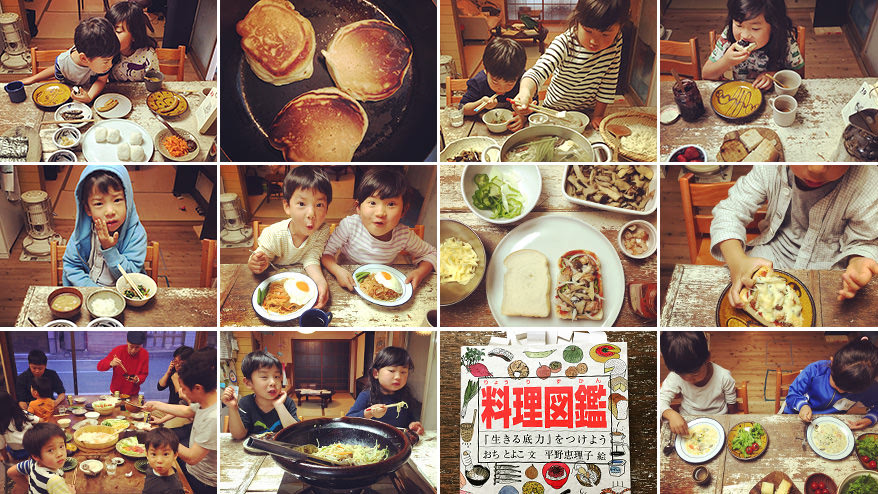プロデュース部 部長の真鍋です。
前回のフードハブ・プロジェクトの記事を読んだ人から、「なぜこの事業をやりたいと思ったんですか」と尋ねられることが増えてきました。そこで今回は、いま自分自身が感じていることを書いてみたいと思います。
アメリカのジャーナリスト、マイケル・ポーラン氏の著書『人間は料理をする』(上巻:火と水、下巻:空気と土)の中に「なぜ、料理か?」という序論があります。そこに、彼の心をずっとふさいでいたと言ういくつかの疑問が書かれています。
疑問のいくつかは個人的なものだった
-どうすればもっと健康で幸福な家族になることができるだろう?
-とりわけ、ティーンエイジャーの息子とうまくやっていくには、どうすればいいだろう?その他の疑問はやや政治的なもので
- 一市民として、どうすればアメリカの食料システムをもっと健康的で持続可能なものにできるだろう?
- 消費社会に暮らしながら自給自足の度合いを高めるためには、どうすればいいだろう?もっと哲学的な疑問もあり
- 日常生活の中で、どうすれば自然界と人間の役割をより深く理解できるだろう?そしてわたしは気づいたのだ。これらの問いと向き合うために森へ出かけるのもよいが、ただキッチンへ行くだけで答えが見つかるということに。
『人間は料理をする・上:火と水』(マイケル・ポーラン著 エヌティティ出版 2014年 )
この本は様々な料理家に師事したマイケル・ポーラン氏の実体験をもとに書かれており、私の食に対する疑問への答えもほとんど書かれています。しかしポイントは、"身をもって日常的に料理をしてみないと本質的にはわからない"という点です。
なら、やってみようと。
そこで約1ヶ月間、家事(料理、洗濯、掃除など)のすべてを一手に引き受け、「#ほぼ毎日つくるよ」をテーマに、家事をやってみました。結婚して12年、上の子が産まれて8年間、すべての家事を妻に任せてきた私が、この体験からどんなことを感じたのか。マイケル・ポーラン氏の疑問(「個人的」「政治的」「哲学的」)に照らし合わせながら書いてみたいと思います。
「個人的」な疑問:料理と家族との関係
-どうすればもっと健康で幸福な家族になることができるだろう?
-とりわけ、ティーンエイジャーの息子とうまくやっていくには、どうすればいいだろう?
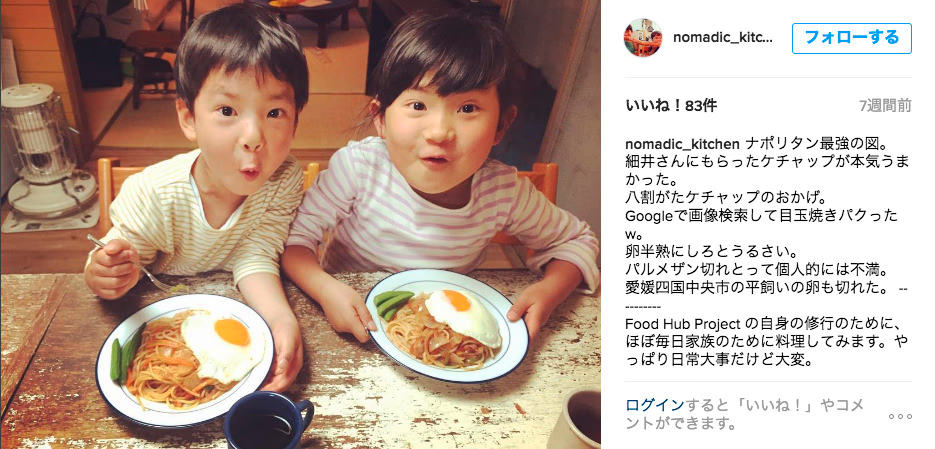
私には、8歳の娘と5歳の息子がいます。
毎日、小学校、保育園から帰ってくると「おなかすいたー!」の連呼がはじまります。妻から言われたのは、基本は和食、でも飽きるから適度に洋食も混ぜながら、ということ。
彼らが食べたいものでもなく、私が作りたいものでもなく、彼らに「食べさせるべきもの」をいかに毎食つくるか。朝はなるべく味噌汁とご飯で、と思うものの、夕食はどうしても洋食が中心になってしまう。また、週末はスープとパンケーキ、パスタといったように小麦の頻度が上がっていきました。
結論。健康の視点では、無理でしたw
悪いものは食べさせてない自信はありますが、どうしても夜は、油、乳製品(バター、チーズ)、小麦粉(パスタ、パン)などを使いすぎて、結果、娘は、この1ヶ月で2キロも太っていました。(娘は20kg程度の体重なので、約10%もの体重が増えたことになります…汗。大人だと5kg増ぐらいかな。)健康の観点からは、相当だめだったなぁと思っています。
もちろん、いいこともありました。
「家族で食卓を囲むことは大事」とよく言いますが、父親になり仕事の忙しさを理由に全くと言っていいほどできていなかったこのことが、本当に大切だということ。
『人間は料理をする』の序論の中に、下記のような一節もあります。
料理は、食料だけでなく、社会の発達ももたらした。人類は決まった時間に決まった場所で、集団で食事をとるようになった。これは新しいことだった。それまでは、他の動物とおなじく、ひとりひとりが食料を見つけ、自分だけで食べていたのだ。(そういう意味では、外で個食することが増えた現代人に似ている)。料理されたものを囲んで座り、視線を交わし、食べ物を分けあい、自制することは、社会性を育てた。
私が料理するものに対して、毎日、毎食、子どもたちと、これはどうだ、あれはどうだという会話になります。当然、旬の食材があれば季節の話にも。
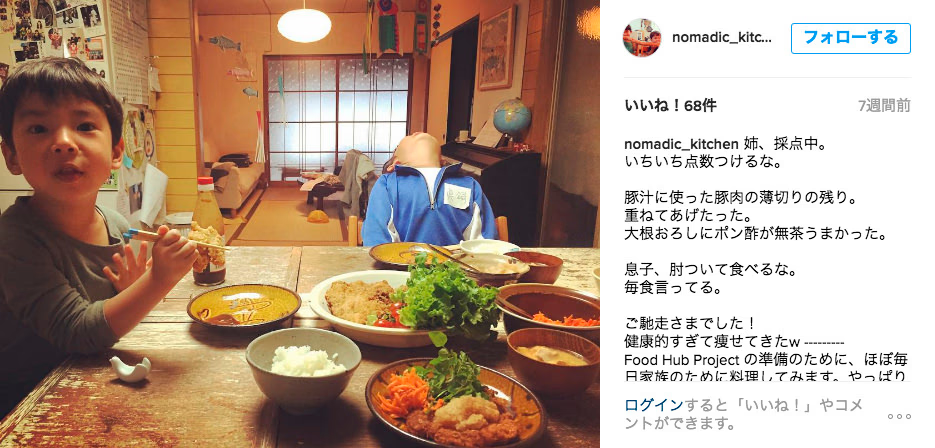
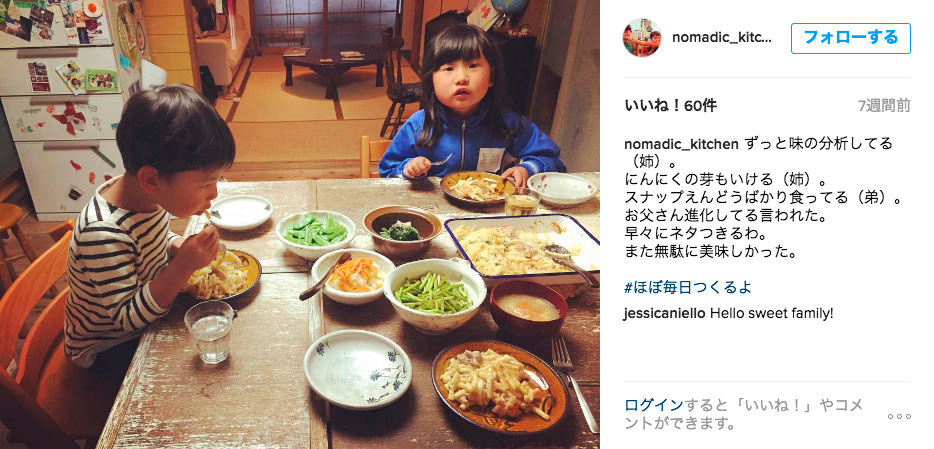
人が作った物を、味わい、分析し、コメントをしていく。1ヶ月限定の実験ということで子どもたちにとっても本来の日常ではないのですが、「好き!嫌い!」という風に、ものごとをきちんと言語化して評価し、それを食卓で高い頻度で話し合うことは大切だなぁと。
また、どうすれば父親はもっと美味しいものを作れるようになるのか、という子どもたちなりの行動も見て取れて興味深かったです。
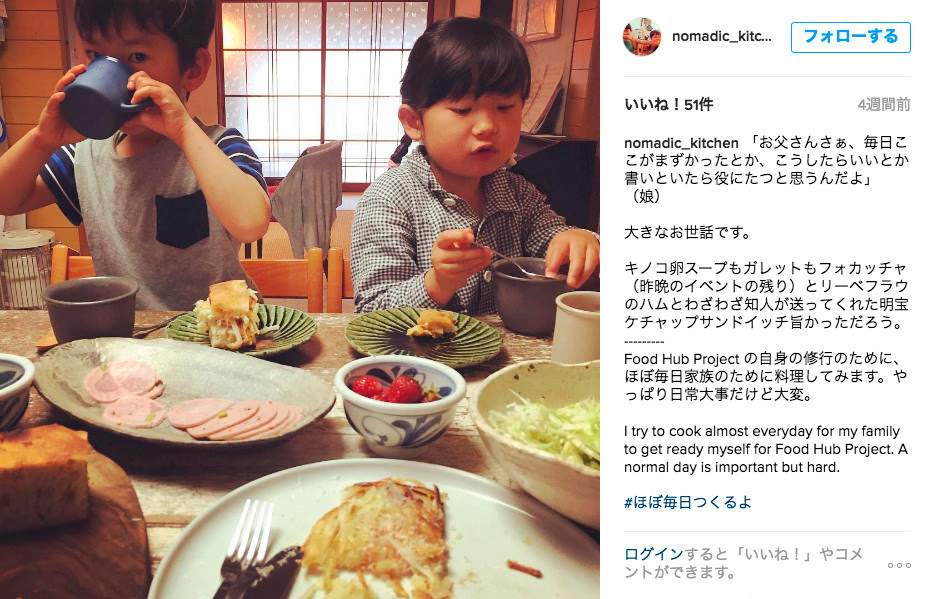
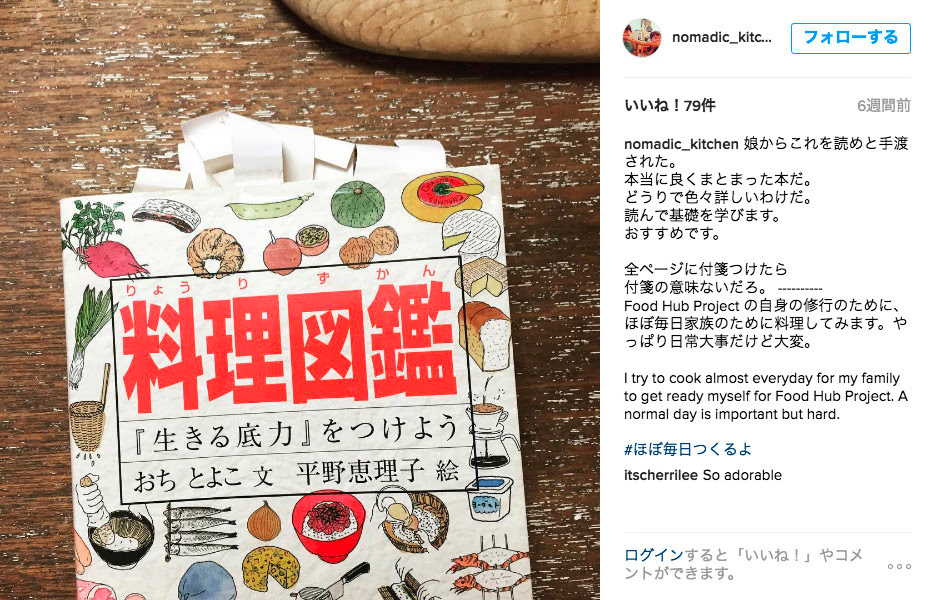
こういう家庭内での時間が、子どもだけでなく、大人にとっても「社会性」を形成していくプロセスなんだろうなと思います。一方で、別々のものを別々に食べ続けたり、工場で製造された食品を食卓に並べることを高い頻度で続けると、食べることにおける社会的側面はかなり弱くなるのではないかと感じました。
それにしても「日常」は本当に大変。働きながら毎日家事をこなす母たち(父も)を心から尊敬します。
素材から料理し、家族で一緒に食べる貴重な時間を大切にすること。時には、きちんと加工されたものを選んで食べたり、家族で外食するということの大切さもあらためて感じた1ヶ月間でした。(正直なところ週1回くらいは外食ですませたかったw)
「政治的」な疑問:人任せの食の安心と安全
- 一市民として、どうすればアメリカの食料システムをもっと健康的で持続可能なものにできるだろう?
- 消費社会に暮らしながら自給自足の度合いを高めるためには、どうすればいいだろう?
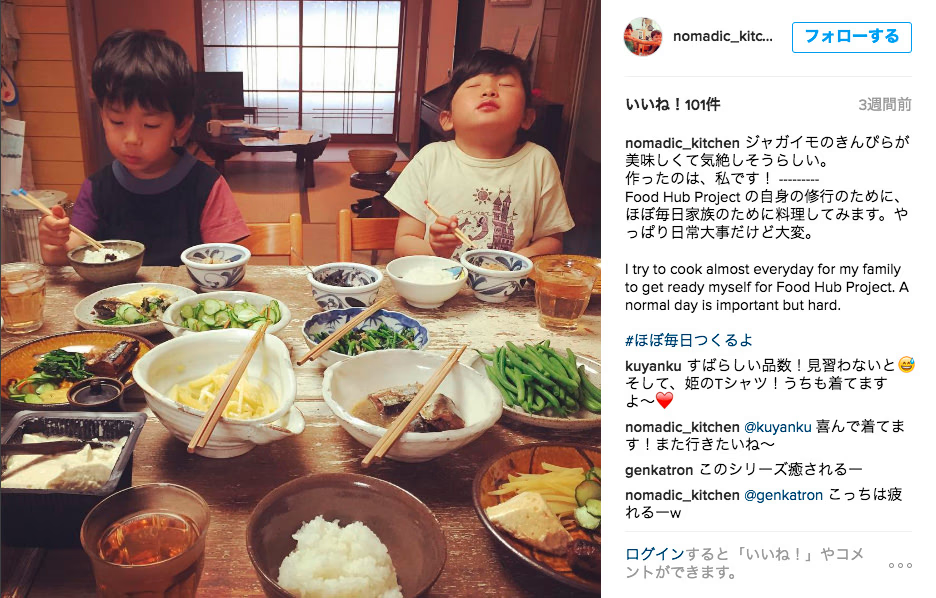
「里山の会」という農家グループの方が育てた収穫したてのジャガイモ。写真左下の豆腐は添加物を使用していない、大豆の味そのままの豆腐なので塩だけで食べるのが美味しい佐那河内村(となり村)の「おっさん豆腐」。
よく「自分たちの子供に食べさせたい安心、安全なもの」という言葉を耳にします。
しかし今の時代においては、「安心、安全」を自分で確保しようとすると、極端に大変です。私が住んでいる神山にも、いわゆる自然食品店というものは無いので、「安心、安全」を誰かに委ねるとなれば、徳島市内まで往復約1時半の距離を車で移動して食材を調達するしかありません。
毎日の家事(料理、洗濯、掃除など)を自分が思い描く水準で維持しながら、子どもを育て、自分がやりたいことを仕事にするためには、分業化はさけられません。子育てを中心にめまぐるしく過ぎていく日々の中で(子育てが中心かどうかは家庭にもよりますが)、せめて食材や調味料くらいは「安心、安全」なものを、この過疎化が進む神山でも日常的に確保できるようにしたいと心から感じました。
地元(正確には隣町の石井)で育てられている食材のひとつに「すだち鶏」という鶏肉があり、神山のお肉屋さんで買うことができます。国産の飼料を与え、抗生物質を使わずに育てられた「安心、安全」の鶏肉があるだけでも素晴らしい環境だなと思います。一方で、育てるのも殺すのも人任せで、お金を出すだけで「安心、安全」を確保している自分の存在にも気づきます。
この1ヶ月間で見えてきたのは、食べることに関する非常に多くの物事を、自分自身がいかに人任せにしてきたか、ということです。
毎日キッチンに立って料理をしていると、自らが「生産者」になっている感覚が味わえます。私が作った料理を、子どもたちは親が作ったものだからと何の疑いもなくモリモリ食べるのです。(時には不味そうに)
大切なのは、料理をすることとで、ふだん自分が人任せにしている多くの物事を日常的に感じること。そして「消費社会に暮らしながら自給自足の度合いを高める」という視点で、安心、安全な食材を「育てる人」たちとの関係性を深め、一緒にバランスをとっていくことではないかと思っています。
「哲学的」な疑問:理を料る(ことわりをはかる)
- 日常生活の中で、どうすれば自然界と人間の役割をより深く理解できるだろう?
神山里山の会のメンバーが育てる有機栽培のニンジン。その多くは今は県外に出荷されているので、きちんと地域で循環させる仕組みをフードハブと連携して検討中。
料理というのは、どこまでも理(ことわり)を料(はか)ることで、
不自然な無理をしてはいけないのであります。
北大路魯山人の言葉です。
1ヶ月間、毎日キッチンに立つことで痛切に感じたのは、私自身の「食べる」ということへの考えの浅はかさと、食材を活かす技術のなさです。これは罪です。
神山では、生ごみは捨てられません。
ほとんどの家庭がコンポストを庭に設置していて、私の家の庭にも2つあります。購入した食材に加え、おすそ分けでたくさんいただく旬の野菜や山菜などを、冷凍技術などを駆使して(冷蔵庫がなかった時代の人は本当にすごい!)、美味しく料理しながらどうやって使い切るのか。
初期に(割りと高い頻度で)食材を使い切れずに、コンポストに入れている自分が、本当に情けなくなりました。正直、たった1ヶ月キッチンに立ったくらいでは、冷蔵庫にある食材を活かしきるほどの技術を、少しでも身につけたと言えるレベルには到達していません。
食の安全安心を訴え、良質な暮らしの大切さを求めることは大事です。でも一方で、日々家族のために料理することで、良い食材をどう調達するかよりも前に、自らが出す「生ごみ」についてまずは考え、自宅のキッチンから広がる物事の多様性と奥深さ、更には社会とのつながりについて日々向き合っていくこともとても重要だと感じました。
最後に:多分、わかってないからやるんです。
約1ヶ月の 「#ほぼ毎日つくるよ」を通じて改めて分かったのは、自分自身は、何もわかっていなかったということです。ここまで読んでくれたみなさんはいかがでしょうか?
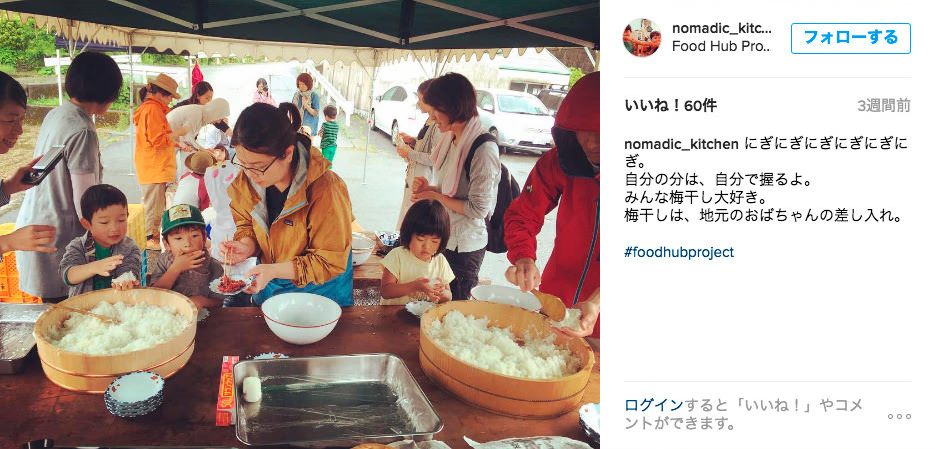
神山に伝わる、もち米をみんなで田んぼに植えたあと、神山産のお米で自分でおにぎりを握って一緒に食べる。フードハブ・プロジェクトは、みんなで育て、料理し、一緒に食べることが基本です。
何もわかっていないことを前提として、地域社会における農業やそれが支える文化を次の世代につなぐために私たちができることは何か。それは料理をして、一緒に食べることからしか見えてこないような気がします。なぜなら、料理は、誰もが気軽に、その気になれば毎日、消費者の立場を捨て、特定の誰かのために作る人=生産者になることができるからです。
また、物事が「非日常」ではなく、「日常」であることも大切だと思います。
作ることの大切さを日常的に感じてもらえる場所、それがフードハブ・プロジェクトが計画している食堂やパン屋さん、食料雑貨店です。資本主義社会に生きる私たちは、稼いだお金を使って消費者であり続ける一方で、料理に関して言えば、すぐにでも生産者になることもできるのです。
消費者である自分と生産者である自分を行ったり来たりしながらも、できることならば、より長い時間「生産者」でいられるよう、フードハブ・プロジェクトがお手伝いできればいいなと思っています。
このプロジェクトは、私の個人的な想いを探求する旅でもありますが、同様に、より多くの人にとっても意味のある旅になればと思っています。まだまだ始まったばかりの試みですが、日々の生活の中で、一緒に楽しみながらみなさんと一緒に深めていけたらと思っています。
ご意見はこちら↓まで。
